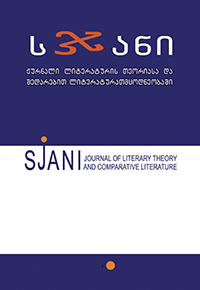XX საუკუნის ოციანი წლების ნარატიული სტრატეგიები
Narrative Strategies of the 20s of the 20th Century
Author(s): Nona KupreishviliSubject(s): Literary Texts
Published by: ლიტერატურის ინსტიტუტის გამომცემლობა
Keywords: Georgian Avant-garde prose; European orientation; prose reconstruction.
Summary/Abstract: The revival of Georgian artistic prose became an important event in the twenties of the 20th century. This turnabout realized on the wave of modernist avant-garde was termed by critics at that time as “prose restoration”, “awakening of the conservative”, and the prose itself - “sensitive seismograph of the gareskneli (another world)”. The historical-cultural precondition of such change in the tenths of the 20th century became the process of modernization started for the creation of a new cultural paradigm that marked European orientation of Georgian culture. As a result of tremendous efforts creative group of Georgian symbolists managed to make a breakthrough from the viewpoint of poetics, form and content of the verse. Now it was the turn of prose that was also waiting for reformation. In special literature there are given rather reserved evaluations concerning the avant garde prose. It is believed that futurism appeared to be more fruitful in poetry than in prose the specifi cs of which consists in deformation of the events, sharp ironical and parody spirit, abstrusity, i.e. unconscious language; besides this, multiplicity of fonts used with hidden regularity, different sizes and number of storeys. A group of Russian innovative writers (A.Kruchionikh, I.Terentiev, I.Zdanevich) who escaped from Russian civil war and found shelter in Tbilisi, displayed great loyalty to the leftist traditions of avant-gardism, unlike those poets (Khlebnikov, Mayakovsky, Kamenskii, Aseev, Burliuk, etc) who stayed in their motherland and led Russian futurism in different direction. Being heterogenic from the beginning, at the verge of the tens and twenties still more heterogeneous Tbilisi was disgusted among the local intelligentsia. Their patriotic aspirations were alien to the requirements of manifesto of the Futurists who tended to free a word from overall diktat, moreover Dadaists. From this viewpoint of special importance is this sample of “consultation” of Georgian Futurists with Igor Terentiev: Georgian Futurists to I.Terentiev: “Our Tasks? Who is to be bitten? With what to scold? What to do?” Terentiev: “Nothing, but poetic international. Handle with combination of languages”. Response: “It is impossible in Georgia, they will kill us”… Clearly, the environment so sensitive to language identity as was ours in the depth of which new literary trend was to be established made certain corrections in the plans of young futurists. In spite of this the relation of Georgian avant-garde to classical narrative artistic specimens is unambiguously negative. (S.Chikovani’s “The Death of Belles-Lettres”, D.Shengelaya, “Comentaria de bello Galico”.
Journal: სჯანი
- Issue Year: 2011
- Issue No: 12
- Page Range: 195-202
- Page Count: 8
- Language: Georgian

